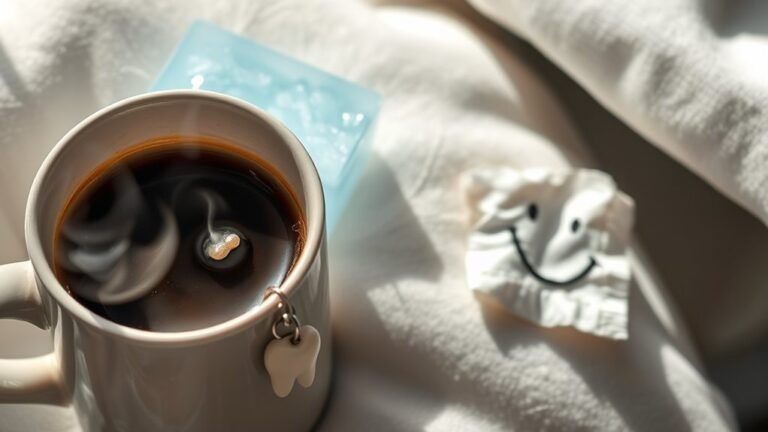Coffee and Acne: Can Coffee Help Clear Your Skin?
Coffee may have both positive and negative effects on your skin. Its antioxidants can reduce inflammation and potentially improve acne appearance. However, caffeine can also lead to dehydration, which might worsen some skin issues. Individual reactions vary, so monitoring your skin’s responses is essential. Incorporating coffee in scrubs or masks may benefit your skincare routine. Understanding how coffee interacts with your skin can lead to more effective choices; there’s much more to explore about its skincare potential.
Understanding Acne: Causes and Triggers

When you consider your skin’s health, it is vital to understand that acne results from a complex interplay of factors, including hormonal fluctuations, excess oil production, and the presence of bacteria. Hormonal fluctuations, particularly during puberty, menstruation, or stress, can trigger increased oil production, leading to clogged pores. Lifestyle factors, such as diet, sleep, and stress management, also play significant roles. For instance, high-glycemic foods may exacerbate inflammation, while inadequate sleep can disrupt hormonal balance. Understanding these connections empowers you to make informed choices. By recognizing how your daily habits influence your skin, you can take proactive steps toward clearer skin, fostering a sense of freedom in managing your health and well-being.
The Composition of Coffee: What’s Inside?
Understanding the interplay between diet and skin health can reveal how various foods and beverages, like coffee, impact your complexion. Coffee is rich in several key nutrients, including antioxidants, vitamins, and minerals. The antioxidants, particularly chlorogenic acids, may help reduce inflammation and promote skin health. Depending on your brewing methods—be it espresso, French press, or drip—these nutrients can vary greatly. For instance, French press might retain more oils and antioxidants compared to other methods. Additionally, coffee contains small amounts of B vitamins, potassium, and magnesium, all of which contribute to overall health. By recognizing these coffee nutrients, you can make informed choices about your consumption, ultimately influencing your skin’s appearance and well-being.
How Caffeine Affects the Body

Although caffeine is often celebrated for its stimulating effects, it also plays a complex role in various bodily functions that can impact overall health, including skin condition. Understanding how caffeine affects your body can provide insights into its potential effects on your skin.
- Caffeine absorption varies by individual, depending on genetics and tolerance.
- It enhances caffeine metabolism, influencing how quickly your body processes this stimulant.
- Caffeine can increase blood flow, potentially affecting skin health.
- It acts as an antioxidant, which may help combat oxidative stress.
The Link Between Diet and Skin Health
While many people focus on topical treatments for acne, the role of diet in skin health is equally significant. Your dietary habits can influence various skin conditions through factors like nutrient absorption and hydration balance. Understanding how food sensitivities and gut health affect your skin is essential, as hormonal influences can also play a role. High sugar intake, for instance, may exacerbate acne flare-ups.
Here’s a simple breakdown:
| Factor | Impact on Skin Health | Dietary Considerations |
|---|---|---|
| Nutrient Absorption | Affects skin repair | Incorporate vitamins |
| Hydration Balance | Maintains skin elasticity | Drink enough water |
| Food Sensitivities | Triggers inflammatory responses | Identify and avoid triggers |
| Gut Health | Influences overall health | Focus on probiotics |
| Sugar Intake | Can worsen acne | Limit processed sugars |
Understanding this link empowers you to make informed choices for healthier skin.
Coffee’s Antioxidant Properties

Coffee, often celebrated for its stimulating effects, is also rich in antioxidants that can benefit skin health. These antioxidants combat free radicals, reducing oxidative stress, which is known to contribute to skin issues like acne. Here are some key coffee benefits related to its antioxidant effects:
Coffee is not just a pick-me-up; its antioxidants can significantly enhance skin health by combating free radicals and reducing oxidative stress.
- Neutralizes Free Radicals: Helps protect skin cells from damage.
- Promotes Skin Repair: Aids in the regeneration of damaged skin.
- Enhances Blood Circulation: Improves nutrient delivery to skin cells.
- Reduces Signs of Aging: May help diminish fine lines and wrinkles.
Can Coffee Reduce Inflammation?
Research indicates that coffee possesses anti-inflammatory properties that may benefit skin health. Caffeine, a key component, has been shown to reduce inflammation by inhibiting certain pathways in the body. Understanding these effects can help you evaluate how coffee might influence acne and overall skin condition.
Anti-Inflammatory Properties
Although many factors contribute to acne development, the anti-inflammatory properties of coffee have garnered attention for their potential role in reducing skin inflammation. The anti-inflammatory benefits of coffee can aid in skin healing, possibly leading to clearer skin. Here are some key points to reflect on:
- Contains antioxidants that combat free radicals
- May reduce redness and swelling in affected areas
- Promotes better blood circulation, enhancing nutrient delivery
- Supports overall skin health by regulating inflammatory responses
Incorporating coffee into your skincare routine or diet could offer these benefits, but remember, it’s essential to combine it with other healthy practices for best results. By understanding how coffee impacts inflammation, you can make informed decisions about your skincare approach.
Caffeine Effects on Skin
When considering the impact of caffeine on skin health, it’s important to recognize its potential to reduce inflammation and improve overall complexion. Caffeine absorption in the skin can enhance blood flow, which may contribute to a healthier appearance. Additionally, studies suggest that caffeine can promote skin hydration, further supporting its role in maintaining a radiant look.
| Effect | Mechanism | Benefits |
|---|---|---|
| Inflammation Reduction | Inhibits inflammatory pathways | Decreases redness and swelling |
| Improved Circulation | Enhances blood flow | Promotes nutrient delivery |
| Hydration Boost | Increases water retention | Enhances skin elasticity |
Personal Experiences: Coffee and Skin Reactions

Your skin’s reaction to coffee can vary considerably based on individual skin types and caffeine sensitivity. Some people might experience breakouts or irritation, while others notice no adverse effects at all. Understanding these personal experiences can provide valuable insights into how coffee may interact with your skin health.
Individual Skin Types
As individuals differ in their skin types and sensitivities, the impact of coffee on acne can vary considerably from person to person. Your skin type—whether oily, dry, sensitive, or combination—plays a significant role in how coffee affects you.
Consider these factors:
- Oily skin: May exacerbate hormonal acne due to increased oil production.
- Dry skin: Could benefit from coffee’s anti-inflammatory properties, potentially reducing acne scars.
- Sensitive skin: Might react negatively to caffeine, causing irritation.
- Combination skin: Requires a balanced approach, possibly integrating coffee alternatives into your skincare routine.
Understanding your skin type and caffeine preferences can help tailor your skincare routine for ideal results.
Caffeine Sensitivity Effects
Caffeine sensitivity can greatly influence how coffee affects your skin, particularly in relation to acne. Your body’s caffeine metabolism plays an essential role; if you’re sensitive, even small amounts can trigger sensitivity symptoms like increased heart rate, anxiety, or skin reactions. These reactions may exacerbate acne by stimulating oil production or inflammation, leading to breakouts. You might notice that your skin becomes more reactive after a cup of coffee, indicating that your sensitivity could be at play. Understanding your unique response to caffeine is important. Keeping a journal of your coffee intake and skin changes can help you pinpoint any correlations, empowering you to make informed choices about your consumption and its potential effects on your skin health.
Expert Opinions: Dermatologists Weigh In
While many enjoy their daily cup of coffee, the relationship between this popular beverage and acne remains a topic of debate among dermatologists. Some experts suggest that coffee’s benefits may extend beyond energy boosts and into skin health, while others warn about potential drawbacks. Here’s what dermatologists generally agree on:
- Coffee’s caffeine may reduce inflammation, potentially benefiting some skin conditions.
- Excessive consumption could lead to dehydration, possibly exacerbating acne.
- Antioxidants found in coffee can support skin health but may not directly clear acne.
- Individual responses to coffee can vary greatly, necessitating personal experimentation.
Ultimately, understanding how coffee interacts with your skin is essential for determining its role in your skincare regimen.
Tips for Incorporating Coffee Into Your Skincare Routine

Incorporating coffee into your skincare routine can be a beneficial way to leverage its potential advantages for skin health. Start with coffee scrubs for gentle exfoliation, promoting cell turnover and unclogging pores. You might enjoy coffee masks, which can hydrate and brighten your skin. Consider using coffee toners to balance oils and minimize inflammation. For targeted care, coffee spot treatments can help diminish blemishes. Coffee serums and moisturizers can offer antioxidant protection while keeping your skin hydrated. You could also try coffee steam to open up pores before applying other products. Coffee baths or infusions can provide a relaxing, full-body treatment, further enhancing your skin’s health. Embrace these methods to potentially enjoy clearer, healthier skin.
Frequently Asked Questions
Can Excessive Coffee Consumption Worsen Acne Symptoms?
Excessive coffee consumption can potentially worsen acne symptoms, especially if you’ve got caffeine sensitivity. High caffeine intake may lead to hormonal imbalances, triggering increased oil production in your skin. This can create an environment that fosters acne development. If you notice breakouts after your coffee fix, it might be worth considering how much you’re consuming. Moderation could help you maintain clearer skin while allowing you to enjoy your daily brew.
Does Decaffeinated Coffee Affect Skin Health Differently?
When considering decaf benefits versus caffeine impact, it’s essential to understand how each affects your skin. While caffeine can increase stress hormones, potentially worsening skin issues, decaffeinated coffee may offer antioxidant properties without the same hormonal spikes. This means you might enjoy the flavor and potential health perks of decaf without risking negative skin reactions. Ultimately, your choice could lead to a more balanced approach to skin health and overall well-being.
Are There Specific Coffee Types Better for Acne?
When considering specific coffee types for acne, espresso benefits can’t be overlooked. Its concentrated form of coffee delivers a higher antioxidant content, potentially aiding skin health. Furthermore, arabica advantages include lower acidity levels, which might be gentler on your skin compared to robusta. While there’s no definitive proof that particular coffee types directly affect acne, these characteristics suggest that certain selections could be more beneficial for your skin than others.
Can Coffee Trigger Allergic Reactions Affecting the Skin?
Yes, coffee can trigger allergic reactions that affect your skin. If you have coffee allergies, consuming it may lead to symptoms like skin irritation, rashes, or hives. This reaction occurs due to the body’s immune response to proteins found in coffee. If you notice any adverse skin reactions after drinking coffee, it’s wise to consult a healthcare professional. They can help determine if coffee is the culprit and suggest appropriate alternatives for your diet.
How Does the Brewing Method Influence Coffee’s Skin Benefits?
When you brew coffee, it’s like conducting a delicate symphony, where each element plays an essential role. The brewing temperature affects the extraction of beneficial compounds, while the filter type can trap or release oils rich in antioxidants. Higher temperatures may yield more of these beneficial compounds, but different filters can influence the final composition. Understanding these variables can empower you to maximize coffee’s potential skin benefits, enhancing your journey towards healthier skin.






